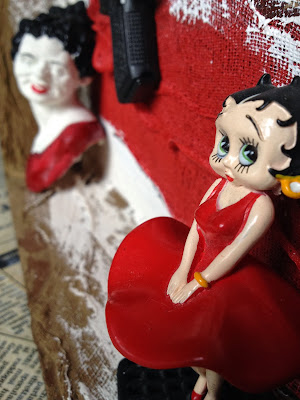BAMBINI CHE GIOCANO SULLE RIVE DELL'INFINITO
CHILDREN PLAYING ON THE BANKS OF THE INFINITE
teca rammemorante
recollection display case
( English below)
Il titolo di quest'opera è tratto da un'intervista che l'artista italiano Claudio Parmiggiani rilasciò nel febbraio 2002 a Sylvain Amic: "Conosciamo il tempo meno di ogni altra cosa...siamo come bambini che giocano sulle rive dell'infinito." . Lo sfondo stesso della teca è l'immagine di un allestimento che l'artista realizzò nel 2008 al Collège des Bernardins a Parigi. Nelle opere di Parmiggiani vi è una mutazione poetica degli oggetti dal simbolismo violento: violento nel senso di capace di suscitare forti impressioni, di elargire associazioni in silenzio. Nel suo lavoro amo la valenza archetipa rivisitata dei suoi temi, che egli architettonicamente compone in modo ordinato. Il mio lavoro si può definire come un folk surrealism, un surrealismo popolare, essendo legato a quel principio di automatismo psichico menzionato da André Breton: pratico un’arte
figurativa e non astratta, tramite un dialogo serrato tra gli oggetti, tra accostamenti inconsueti e deformazioni irreali.
L’approccio al surrealismo è stato diverso da artista
ad artista, per le ovvie ragioni delle diversità personali di chi lo ha
interpretato. Ma, in sostanza, la tecnica
surrealista si suddivide in due grosse categorie: quella degli accostamenti
inconsueti e quella delle deformazioni irreali.
Gli accostamenti inconsueti sono stati spiegati da Max
Ernst, pittore e scultore surrealista. Egli, partendo da una frase del
poeta Comte de Lautréamont: «bello come l’incontro casuale di una
macchina da cucire e di un ombrello su un tavolo operatorio», spiegava
che tale bellezza proveniva dall’«accoppiamento di due realtà in
apparenza inconciliabili su un piano che in apparenza non è conveniente
per esse».
Lavoro accostando oggetti e spazi tra loro apparentemente estranei per ricavarne
una nuova semantica.
Questo procedimento ha come fine lo
spostamento del senso: la dislocazione degli oggetti, che
abitualmente siamo abituati a vedere in base al senso comune, in visioni che ci trasmettono l’idea di un diverso ordine della realtà.
The title of this work is taken from an interview that the Italian artist Claudio Parmeggiani granted in February 2002 to Sylvain Amic: "We know time less than anything else...we are like children playing on the banks of the infinite". The background of the display case is the image of an installation that the artist created in 2008 at the Collége des Bernardins in Paris. In the works by Parmiggiani there is a poetic mutation of the objects having a violent symbolism: violent in the sense that it is capable of arousing strong feelings, of bestowing associations in silence. In his installations I appreciate the archetypal significance revisited with his themes, which he composes architecturally in a tidy way. My work can be defined as a folk surrealism because it is related to the principle of psychic automatism mentioned by Andrè Breton: practical and not abstract figurative art, through a close dialogue between objects, including unusual combinations and unreal distorsions.
The approach to Surrealism was different from artist to artist for the obvious reason of the personal dissimilarities of those who interpreted it. But, in its essence, the technique of Surrealism can be split into in two main categories: that of unusual combinations and that of unreal deformations.
Max Ernst, a Surrealist painter and sculptor, thus explained unusual combinations, starting from a sentence by the poet Comte de Lautréamont: "beautiful as the unexpected encounter of a sewing machine and an umbrella on an operating table."; he stated that such beauty came from "The coupling of two seemingly irreconcilable reality on a plan that is not apparently convenient for them."
I work combining objects and spaces seemingly unrelated to obtain new semantics.
This procedure serves the purpose of shifting the meaning: the displacement of the objects, that we are used to perceive on the basis of common sense, into visions that convey the idea of in a different order of reality.
In questo inconsueto ovile ci sono delle pecorelle. Si tratta del primo omaggio che voglio fare ad un quadro di Pelizza da Volpedo (1868-1907) "Lo specchio della vita" (GAM, Torino) il cui sottotitolo è. " e ciò che l'una fa, e le altre fanno". Questa frase è tratta dal Purgatorio di Dante Alighieri, canto III, versi 79-84:
"Come le pecorelle escon dal chiuso
a una, a due, a tre, e l'altre stanno timidette
atterrando l'occhio e 'l muso;
e ciò che fa la prima, e l'altre fanno,
addossandosi a lei, s'ella si arresta,
semplici e quiete, e lo 'mperchè non sanno"
Inside this unusual fold there are some sheep. It is the first homage to the painting by Pelizza da Volpedo (1868-1907) "The mirror of life" (GAM-Modern Art Gallery, Turin) , whose subtitle is: " and what one does, the others do". This sentence is taken from Dante's "Divine Comedy", in the Purgatory, canto III, verses79-84:
"As sheep come issuing forth from out the fold By ones and twos and threes, and the others stand Timidly, holding down their eyes and nostrils,
And what the foremost does the others do, Huddling themselves against her, if she stop, Simple and quiet and the wherefore know not"
 |
| Pelizza da Volpedo "Lo specchio della vita", 1898 |
Assemblage, plastica, verde Busch® 7359, Preiser® Sensenmann 29004, pecorelle di plastica, chiodo, in cornice di legno cm. 17x17x7, 2013
Assemblage, plastic, Busch® flowers "flocken" 7359, Preiser® Grim reaper 29004, plastic little sheep, spike, in wooden frame 17x17x7 cm., 2013
Assemblage, plastic, Busch® flowers "flocken" 7359, Preiser® Grim reaper 29004, plastic little sheep, spike, in wooden frame 17x17x7 cm., 2013
















